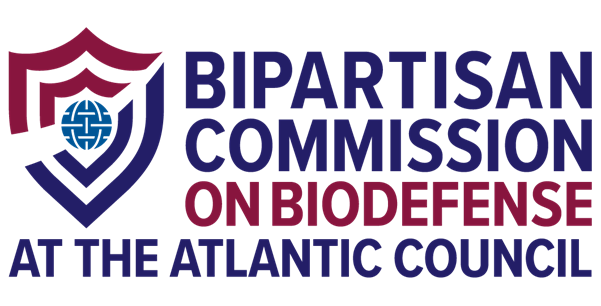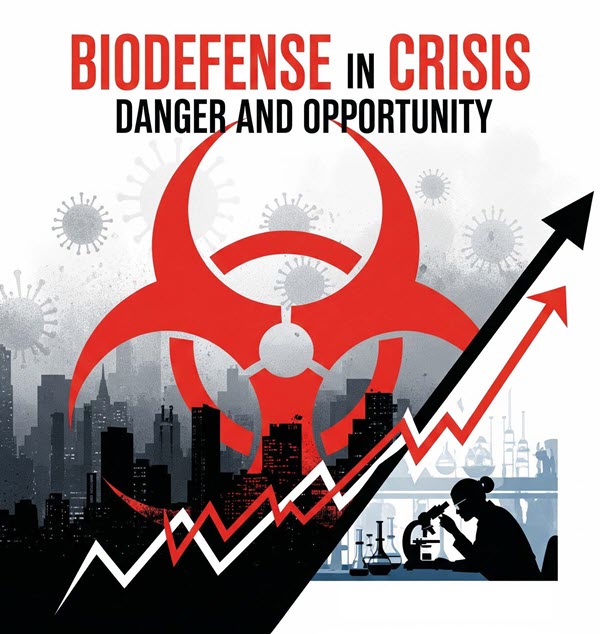
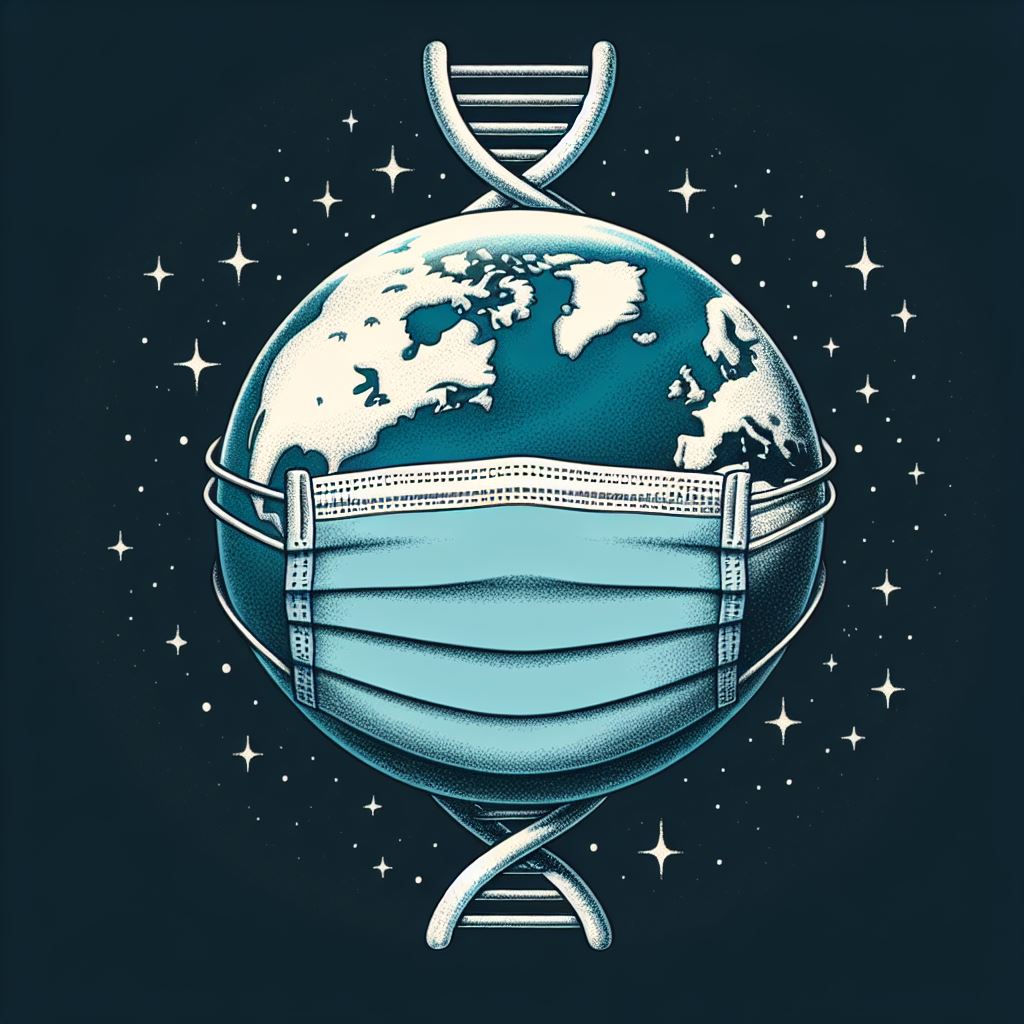
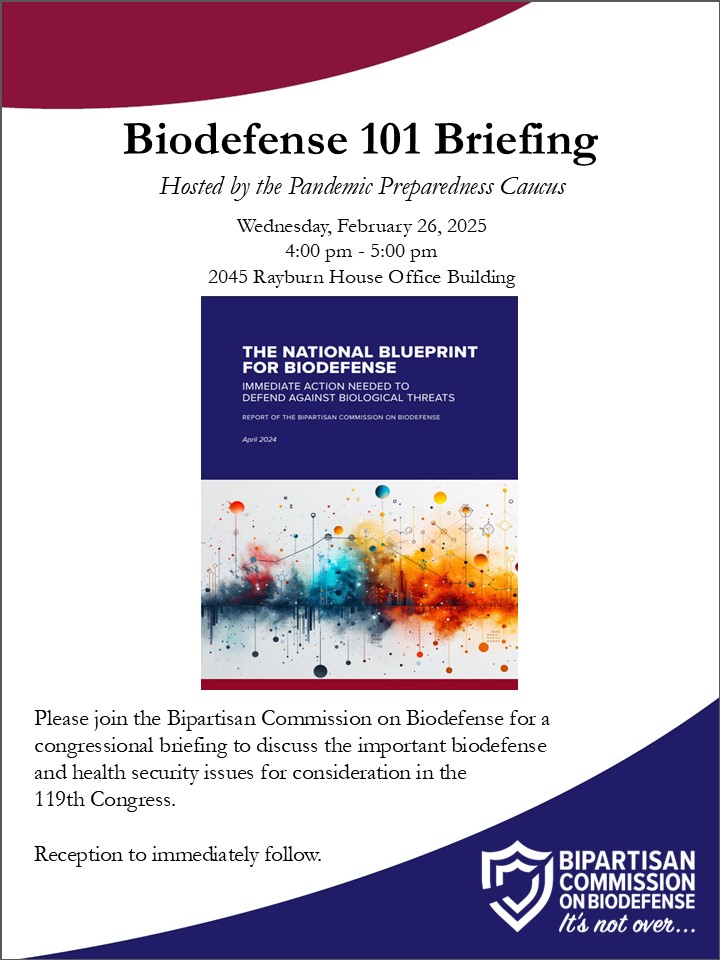
Please join the Bipartisan Commission on Biodefense for an educational congressional briefing to discuss the important biodefense and health security issues for consideration in the 119th Congress. Reception to immediately follow.
View Details
The focus of this meeting will be to provide the Bipartisan Commission on Biodefense with a better understanding of: 1) the effects of climate change on human health and one health, 2) the future implications of migration and shifting disease patterns, and 3) policy considerations to reduce the inevitable impacts of climate change on biodefense.
View Details
The focus of this meeting will be to provide the Bipartisan Commission on Biodefense with a better understanding of: (1) national leadership to defend food and agriculture against influenza; (2) federal operational requirements for preparedness, coordination, and response; (3) biosurveillance, forecasting, and the need for diagnostic tests; and (4) front-line needs and partnerships in the fight against influenza.
View Details
NOTE NEW START TIME FOR THIS MEETING: Meeting will start at 11am (not at 10:30am). The focus of this meeting will be to provide the Bipartisan Commission on Biodefense with a better understanding of: (1) how the federal government currently addresses indoor air quality; (2) new scientific and technological advances for indoor air quality; and (3) how enhancing indoor air quality can help prevent the spread of pathogens.
View Details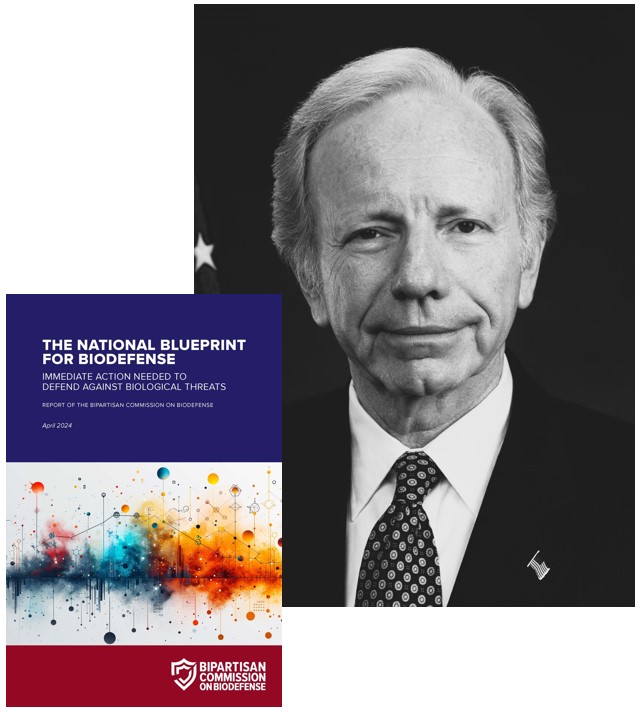
Please join us for a program and reception honoring Senator Joe Lieberman's legacy on the day the Commission releases its landmark 2024 National Blueprint for Biodefense.
View Details
As the Nation continues to endure the consequences of recent pandemics, and with continued interest in biological weapons by nation states and other enemies, the federal government has an opportunity to address vulnerabilities in the biodefense enterprise. At this meeting, the Commission intends to further explore : (1) biodefense policies and activities at the Department of Defense; (2) federal stockpile evaluation and decision-making for smallpox medical countermeasures; (3) needed authorities of the Department of Health and Human Services, including the Centers for Disease Control and Prevention; and (4) biodefense leadership.
View Details
The focus of this meeting will be to provide the Bipartisan Commission on Biodefense with a better understanding of: (1) state and local efforts to strengthen public health and biodefense; (2) special security management of biological threats to mass gatherings; and (3) efforts to understand and mitigate the agricultural impact of biological threats to plants and animals.
View Details
As the biological threat continues to evolve, biological intelligence gathering, analysis, and dissemination activities, as well as information sharing, must increase to keep pace with the advances of our adversaries. At this upcoming meeting, the Commission intends to further explore the expanding nature of the biological threat, the federal biological intelligence enterprise, and information sharing with non-federal governments.
View Details
Executive Director Asha M. George, DrPH will give a presentation entitled "A National Blueprint for Biodefense: Leadership and Major Reform Still Needed to Advance Efforts," at the 30th International Biodetection Technologies: Advanced Technologies & Methods for Global Health & Biodefense Virtual Conference.
View Details
Ambika Bumb, Deputy Executive Director of the Bipartisan Commission on Biodefense, will talk about what reporters need to know about zoonotic threats, the biodefense of animal agriculture, and the reasons to keep writing about pandemic preparedness, particularly given legislation pending in Congress this year. She will also speak to what kind of government plan is required to reduce the risk of another global pandemic in the near future.
View Details
In this upcoming meeting, the Bipartisan Commission on Biodefense intends to further explore the prevention, deterrence, and attribution of biological threats. The discussion will delve into how these critical elements of biodefense can be improved through technology, policy, and coordination. This meeting will inform the Commission’s refresh of the National Blueprint for Biodefense, which we will issue later this year.
View Details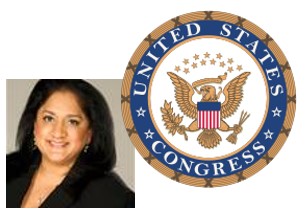
In anticipation of the reauthorization of the Pandemics and All-Hazard Preparedness Act (PAHPA), the bipartisan Congressional Pandemic Preparedness Caucus for the 118th Congress requested the Bipartisan Commission on Biodefense develop and present a PAHPA 101 briefing for better educate Congressional staff on the bill.
View Details
Executive Director Dr. Asha M. George participated in The Bulletin of the Atomic Scientists' Pathogens Project on Creating the Framework for Tomorrow’s Pathogen Research in Geneva, Switzerland.
View Details
Axios hosted an event in Washington D.C. exploring how the U.S. can improve its public health preparedness and why doing so is crucial featuring Bipartisan Commission on Biodefense Executive Director Dr. Asha M. George.
View Details
In this upcoming meeting, the Bipartisan Commission on Biodefense intends to further explore preparedness needs and efforts, new solutions to improve biosurveillance, and data modernization. The discussion will delve into how preparedness coordination between federal and state efforts can be better harmonized and how the nation can best ensure having eyes on the ground during the emergence of a biothreat. This meeting will inform the Commission’s refresh of the National Blueprint for Biodefense, which we will issue later this year.
View Details
Dr. Asha M. George, Executive Director of the Bipartisan Commission on Biodefense, will testify as an expert witness before the U.S. House of Representatives Committee on Energy and Commerce, Subcommittee on Oversight and Investigations tomorrow, February 1, at 2:00 p.m. The hearing, titled Challenges and Opportunities to Investigating the Origins of Pandemics and Other Biological Events, will examine current national capabilities to investigate origins of biological threats, and how to improve those capabilities.
View Details
Seven years after the release of the Commission's National Blueprint for Biodefense, the Nation remains critically unprepared for future biological events, which threaten to strain resources and impact government efforts to address threats like COVID-19. At this meeting, the Commission intends to further explore challenges for biodefense response, recovery, and mitigation capabilities at all levels of government and the private sector.
View Details
Please join us on Thursday, September 22, 2022 when we will convene an in-person meeting of the Bipartisan Commission on Biodefense to better understand how to leverage and establish partnerships for innovation, biological intelligence, and technological defense against biological threats. The meeting will delve into what is needed to incentivize and effectively manage partnerships between the federal government and industry, academia, and nongovernmental organizations to drive the development of new medical countermeasures for current and future threats.
View Details
The Commission's Policy Associate Robert Bradley will be presenting the Commission's latest report, Boots on the Ground: Land-Grant Universities in the Fight Against Threats to Food and Agriculture at the 2022 Joint COPs Summer Meeting entitled "Moving Into The New Normal", on July 20, 2022.
View Details
The Commission's Deputy Executive Director Ambika Bumb will be speaking on Developing Regional Innovation Ecosystems to Accelerate Preparedness at the BLUE KNIGHT SYMPOSIUM 2022, a joint JLABS and BARDA initiative to support early-stage companies working to address future known and unknown health threats.
View Details
The Commission's Research Associate, J.T. O'Brien spoke about Biodefense Preparedness and the need for an Apollo Program for Biodefense at the Medical, Biomedical & Biodefense: Support to the Warfighter Symposium in Chapel Hill, North Carolina on June 8-9, 2022.
View Details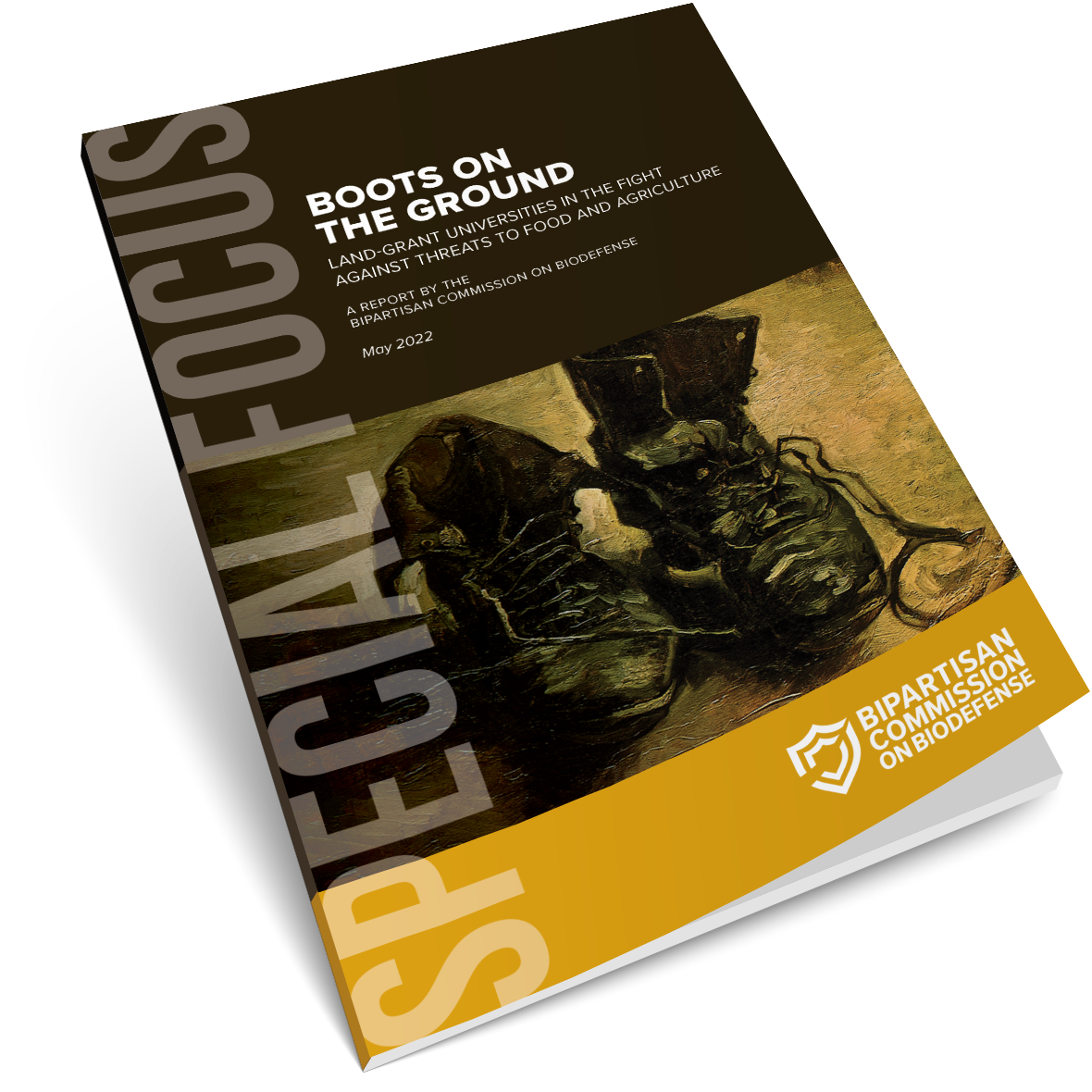

Please join us on Tuesday, May 3, 2022 when we will convene an in-person meeting of the Commission, “When Borders Don’t Matter: Defending the Homeland Against Biological Threats”, to provide the Bipartisan Commission on Biodefense with a better understanding of: (1) biological incidents that affect homeland and national security; (2) roles and responsibilities of the Department of Homeland Security (DHS) in addressing biological threats; and (3) opportunities to enhance national biodefense.
View Details

Women in Homeland Security is pleased to invite you to an exciting Symposium with leaders from the Federal Emergency Management Agency, U.S. Coast Guard, the Bipartisan Commission on Biodefense...
View Details
Please join us on March 22, 2022 when we will convene an in-person meeting of the Bipartisan Commission on Biodefense to provide a better understanding of: (1) the expanding landscape of current and future biological threats; (2) the roles and responsibilities of the federal government in assess and preparing for various biological threats; and (3) biological weapons, bioterrorism, and biological arms races.
View Details
Dr. Asha M. George, Executive Director of the Bipartisan Commission on Biodefense, testifies as an expert witness before the U.S. Senate Committee on Homeland Security and Governmental Affairs this Thursday, Feb. 17, at 10:15 a.m. The hearing, titled Addressing the Gaps in America’s Biosecurity Preparedness will be held in Room 342 of the Dirksen Senate Office Building and via videoconference.
View Details
Join the Commission for in-person meeting to provide a better understanding of ongoing federal efforts to implement The Apollo Program for Biodefense, the role of the private sector in implementing The Apollo Program for Biodefense, how the public and private sectors can fully implement The Apollo Program for Biodefense within ten years.
View Details
Dr. Asha George discussed the global response to COVID-19 and how to better prepare for future pandemics at Conversations before Midnight, a Bulletin of the Atomic Scientists annual event, on November 9, 2021.
View Details
Join the Commission for an in-person meeting to provide a better understanding of challenges facing federal biodetection programs, public and private advancements in environmental biodetection technology, and mission requirements for 21st Century biodetection capabilities.
View Details
Dr. Asha M. George, Executive Director of the Bipartisan Commission on Biodefense, met with a panel of senior leaders of Booz Allen Hamilton to drive discussion on how each market can contribute to the future work of the Biodefense and Health Security Mission.
View Details


The Bipartisan Commission on Biodefense urges policymakers to learn from the COVID-19 pandemic and address critical gaps in the Nation’s biodefense. That needs to happen before we face the next infectious disease pandemic or biological attack. Watch Executive Director Dr. Asha M. George's interview on the Government Matters news program.
View Details
Dr. Asha George examined preparedness infrastructure in place today and the process to build a more sustainable preparedness system to meet current and future needs during ASTHO's September 9, 2021 conference.
View Details
Join the Commission as it assesses the threats and vulnerabilities of cyberbiosecurity in addition to investigating the opportunities and solutions to address these threats, and the role of the federal government in securing the future.
View Details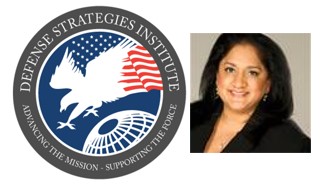
Dr. Asha George shared insights from the Commission's reports regarding coordinated defense against, and the response to, biological threats at the Defense Strategies Institute 9th Annual Joint Civil and DOD CBRN Symposium held at the National Harbor on June 8-9, 2021.
View Details
Dr. Asha George discussed our nation’s vulnerabilities to biological threats and presented key findings that can help strengthen the nation’s efforts to deter biological events.
View Details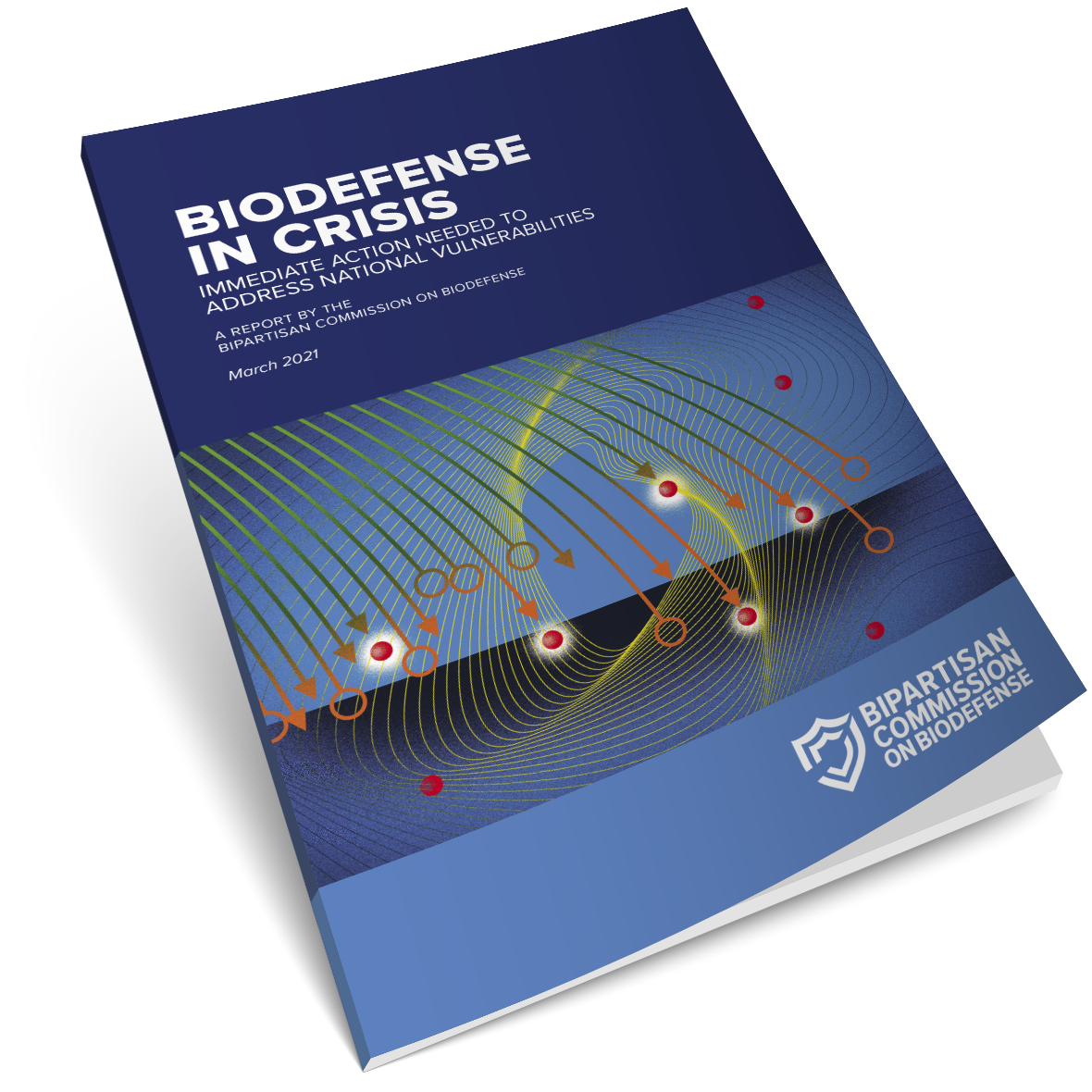
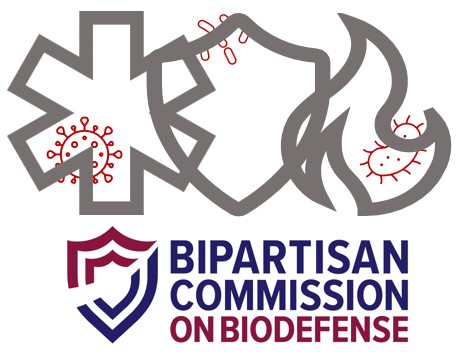
Join the Commission to better understand the needs of the first responder community and how the federal government can better support non-federal response to future biological incidents.
View Details
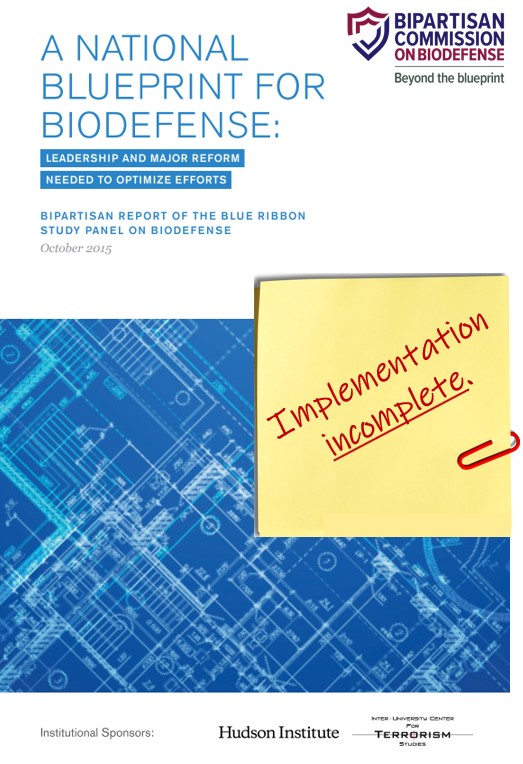
Join the Commission to better understand federal efforts to enhance national biodefense since the 2015 release of the National Blueprint for Biodefense.
View Details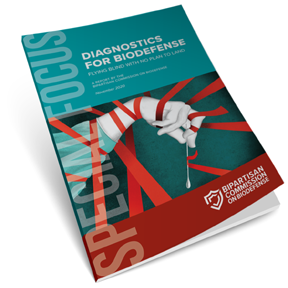

Any comprehensive National Security Emergency Preparedness (NSEP) capability in the United States has atrophied amid the increase of threats that could cause a catastrophic disaster across the country. Dr. Asha George, Executive Director of the Bipartisan Commission on Biodefense joined other experts to discuss how COVID-19 compels better NSEP planning.
View Details
The Bipartisan Commission on Biodefense's Executive Director Dr. Asha M. George will join other experts to discuss common food and agricultural system challenges, scenarios, outcomes and risks to various sectors of the system, cyberbiosecurity strategies, gaps in workforce and training, and research and policy needs.
View Details
What is the number one global security threat the U.S. and world will confront in the coming years? What is the single greatest opportunity before us to advance security around the world? The Bipartisan Commission on Biodefense's Executive Director Dr. Asha M. George joined other experts to provide an inside look on the future conflicts, forces, and opportunities that will shape our world.
View Details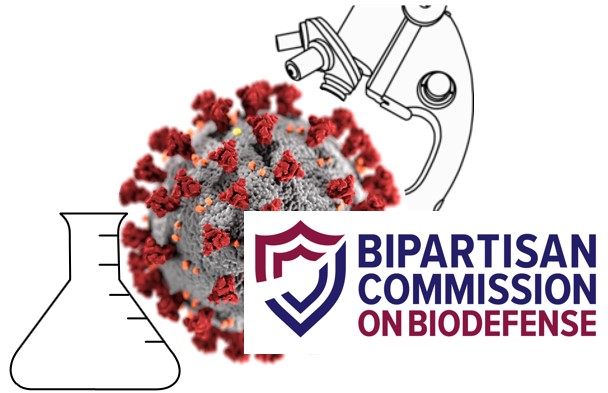
While COVID-19 is the current biological threat we face, it will not be the last and is likely to not be the worst, and man-made disease threats are also becoming increasingly likely due to advances in technology. Innovative science and technology solutions exist or are in development that could change the game for biodefense. At this meeting, the Commission addressed these emerging biological threats and innovative science and technology solutions to address them.
View Details
The Bipartisan Commission on Biodefense's Executive Director, Dr. Asha M. George, again joined the Raw Science Podcast as a guest speaker to discuss what the future holds for dealing with bio threats and what can be done scientifically and legally. Topics include the opening of casinos versus churches, the speed and safety of vaccines, the role of simulations and preparedness, and the responsibility of scientists versus federal agencies and the courts. She is joined by moderator: Sr. Judge Loren Smith, US Court of Federal Claims and guest speaker Dr. Robert Rosner, William E. Wrather Distinguished Service Professor in the Departments of Astronomy & Astrophysics and Physics, and the Harris School of Public Policy at the University of Chicago.
View Details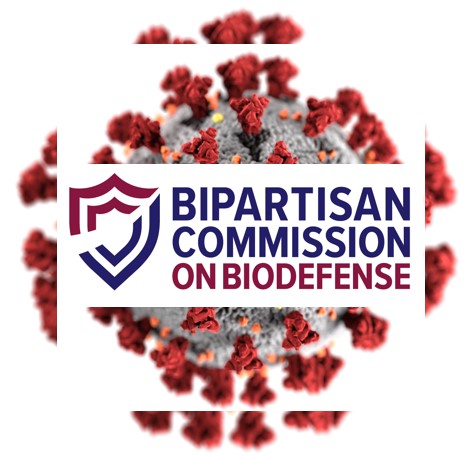
The ongoing novel coronavirus 2019 (COVID-19) pandemic has taken the lives of more than 100,000 Americans and damaged the Nation’s economy. As the country reopens, the disease threatens the public, now and into the foreseeable future. Federal support for state, local, tribal and territorial preparedness and biosurveillance will be crucial to addressing further spread of COVID-19. The Commission addressed national policy and resource needs for response to and recovery from this crisis.
View Details
Dr. Asha M. George, Executive Director of the Bipartisan Commission on Biodefense, was recently interviewed by Jay Mohr, host of the national podcast “Mohr Stories: Put Your Name On It!”. According to Jay, she helped him “get his facts straight” about COVID-19.
View Details
The Bipartisan Commission on Biodefense's Executive Director, Dr. Asha M. George, joined the Raw Science Podcast as a guest speaker to discuss the limits of government control over the movement of people in the context of COVID-19. She is joined by moderator Sr. Judge Loren Smith, US Court of Federal Claims and guest speaker Dr. Robert Rosner, William E. Wrather Distinguished Service Professor in the Departments of Astronomy & Astrophysics and Physics, and the Harris School of Public Policy at the University of Chicago.
View Details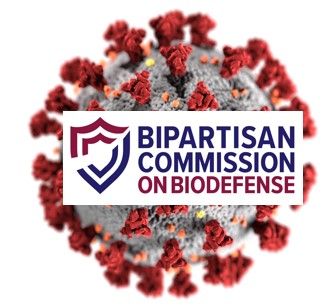
The ongoing novel coronavirus 2019 (COVID-19) pandemic is a real-time stress test of the Nation’s preparedness and ability to respond to emerging infectious diseases.
On May 8, 2020, we premiered a virtual meeting of the Commission-- COVID-19: Forewarned But Not Forearmed-- to better understand the ongoing response to novel coronavirus 2019, national readiness to address possible large-scale spread of the disease in the United States and throughout the world, and implications for improving preparedness for the next biological threat.
Speakers shared their perspectives, experiences, challenges, and recommended solutions with regard to the federal and non-federal responses to COVID-19.

The Bipartisan Commission on Biodefense's Executive Director Dr. Asha M. George joined other experts in an online panel hosted by the Middle East Instititute entitled: Biological Warfare and Pandemics in the Middle East: Confronting a Growing Crisis.
View Details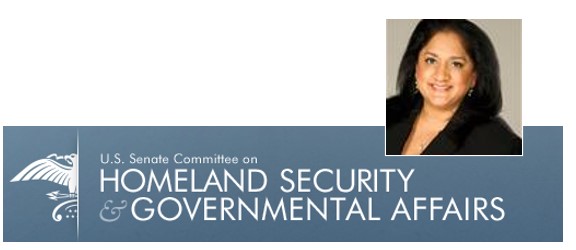
On Wednesday, February 12th, U.S. Senate Committee on Homeland Security and Governmental Affairs held a roundtable hearing titled, "Are we Prepared? Protecting the U.S. from Global Pandemics." The purpose of this roundtable is to examine the nation's level of preparedness against current and future pandemic threats, particularly in the context of the ongoing Coronavirus outbreak that originated in Wuhan, China. The event featured the Executive Director of the Bipartisan Commission on Biodefense, Dr. Asha M. George, as a witness.
View Details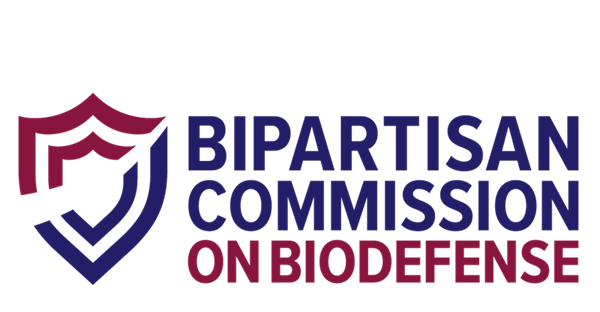
On Monday, February 10th, the Bipartisan Commission on Biodefense and Hudson Institute hosted a panel discussion on the ongoing coronavirus outbreak and how the United States can respond to the growing outbreak effectively.
View Details
Dr. Asha George led a session of the annual meeting entitled Everything Old Is New Again. Dr. George addressed the enormous benefits of advancements in biology which at the same time, raise a host of new concerns. Advances in four areas in particular are occurring extremely quickly: synthetic biology, cyberbiology, microbiology, and biotechnology and Dr. George provided an overview of the changing biological threat landscape and covered ideas such as the creation of a super soldier, the combination of organic matter with nanotechnology, and the use of DNA itself to store information. All of these have very real ethical and national security implications, and are worthy of attention.
View Details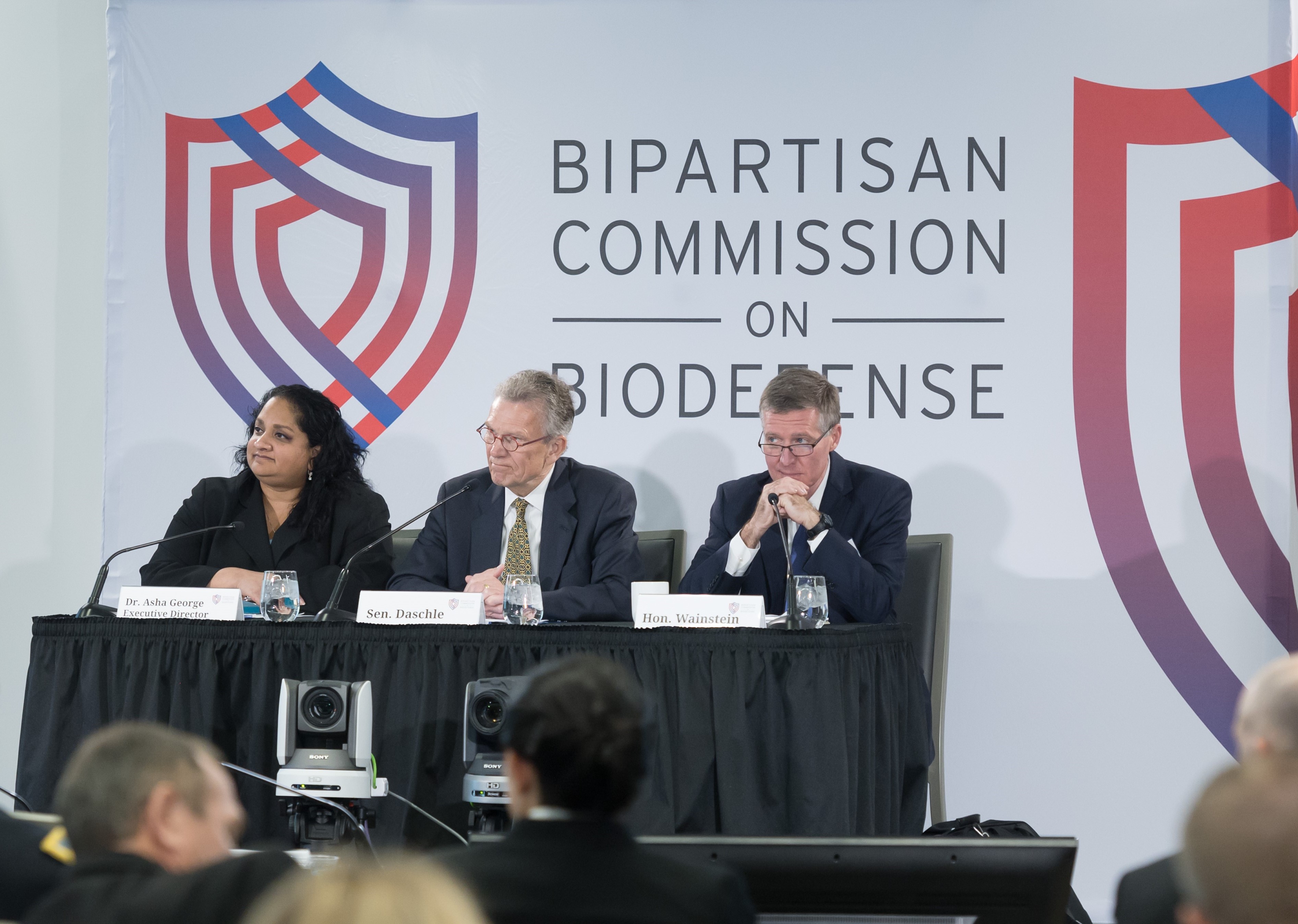
On November 5, 2019, the Bipartisan Commission on Biodefense held a meeting, Too Great a Thing to Leave Undone: Defense of Agriculture at Colorado State University, to inform our continuing assessment of the biological threat, specific vulnerabilities, and overwhelming consequences to agricultural producers.

Colorado State University officials hosted Commissioners Daschle and Wainstein on a tour of campus facilities relevant to agrodefense. The Commissioners were shown locations and capabilities highlighting the University's prominent role in public/private partnerships, association with various federal labs, and advancements in veterinary and translational medicine.
View Details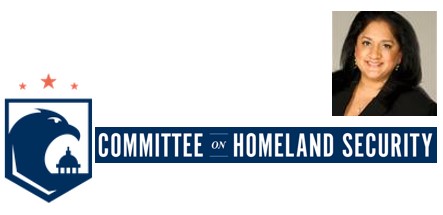
Dr. Asha George testified before the U.S. House Homeland Security Subcommittee on Emergency Preparedness, Response, and Recovery warning the country is not adequately prepared for a potential bio terrorist attack.
View Details
The Bipartisan Commission on Biodefense held a meeting on September 17, 2019 to inform our continuing assessment of the cyberbiological threats, specific vulnerabilities, and consequences. Federal, academic, industry, and law enforcement experts shared their perspectives, experiences, challenges, and recommended solutions with regard to cyberbiosecurity, and talked about public and private sector responsibilities to protect the nation and ensure that the U.S. bioeconomy grows unimpeded.
View Details
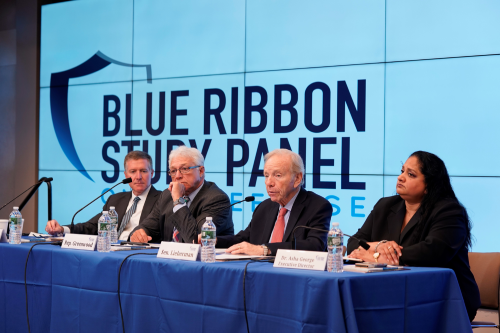
The Blue Ribbon Study Panel on Biodefense held a meeting in New York City on July 11, 2019 to discuss "A Manhattan Project for Biodefense" - a national, public-private research and development undertaking to defend the Nation against biological threats, including biological warfare, bioterrorism, and infectious disease pandemics.
View Details
Panel Executive Director Dr. Asha M. George testified to the National Security Subcommittee of the House Committee on Overview and Reform during the U.S. Biodefense, Preparedness, and Implications of Antimicrobial Resistance for National Security hearing.
View Details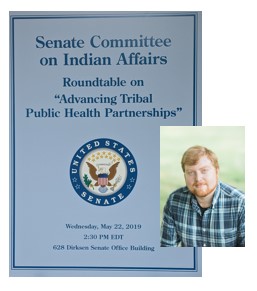
The Senate Committee on Indian Affairs held a round table discussion titled "Advancing Tribal Public Health Partnerships" on May 22, 2019. Rob Bradley was asked to represent the Blue Ribbon Study Panel on Biodefense as an active participant.
View Details
Best-selling author and zombie-expert Max Brooks joined Panel member Ken Wainstein and Panel Director Asha George to discuss Brook's latest graphic novel entitled, "Germ Warfare: A Very Graphic History" at the 2019 Awesome Con on April 27.
View Details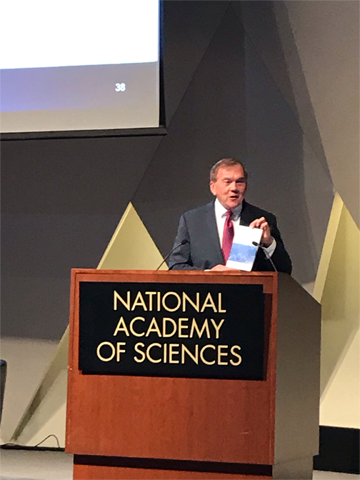
In today’s interconnected world, biological incidents have the potential to cost thousands of American lives, cause significant anxiety, and disrupt travel and trade. The National Biodefense Strategy, released on September 18, 2018, sets the course for the United States to combat the serious biothreats our country faces, whether they arise from natural outbreaks of disease, accidents involving high consequence pathogens, or the actions of terrorists or state actors. The Biodefense Summit aims to engage the biodefense stakeholder community to inform national biodefense enterprise efforts to counter biological threats, reduce risk, prevent, prepare for, respond to, and recover from biological incidents. The Summit will inform implementation of the National Biodefense Strategy.
View Details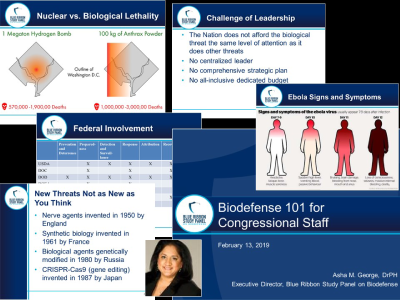
Dr. Asha George, Executive Director of the Blue Ribbon Study Panel on Biodefense, provided a briefing to congressional offices on the severity of biological threats to the country. Topics included federal programs and activities needed to prepare the nation against biological crime, terrorism, warfare, and pandemics. Dr. George also shared recommendations from the Panel’s 2015 report, “A National Blueprint for Biodefense”, which addressed gaps in federal preparedness for a biological event. The briefing closed with discussion of the National Biodefense Strategy, released in September 2018, which was one of the Panel's major recommendations.
View Details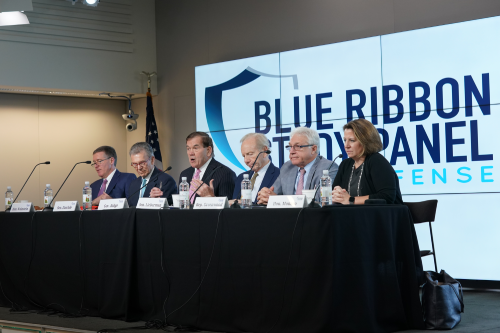
The Blue Ribbon Study Panel on Biodefense held a meeting on February 5, 2019 to get a better understanding of the responsibilities and requirements for federal biodefense efforts that are unique to the U.S. Department of Defense.
View Details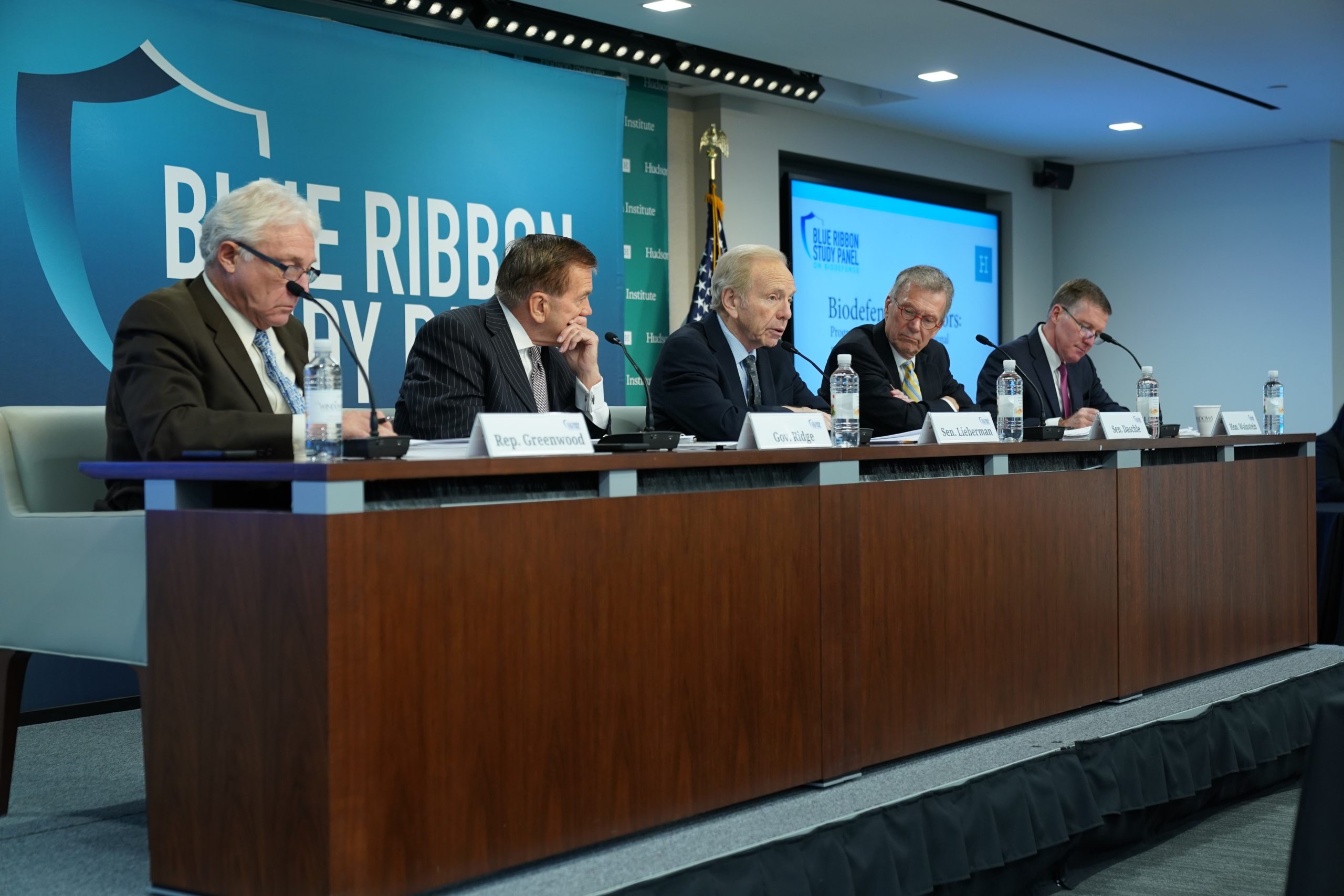
The Blue Ribbon Study Panel on Biodefense held a meeting to gain a better understanding of how far the Executive Branch has come in implementing the National Blueprint for Biodefense. The Panel also discussed the recently released National Strategy for Biodefense with representatives from the White House.
View Details
Former U.S. Senate Majority Leader Tom Daschle is a special guest on an episode of The West Wing Weekly, the popular podcast that explores storylines from the NBC hit TV show, The West Wing.
View Details

The Blue Ribbon Study Panel on Biodefense held a meeting to reexamine the anthrax events of 2001, as well as subsequent biological events to discuss where we are now and what else we need to do to ensure national biodefense.
View Details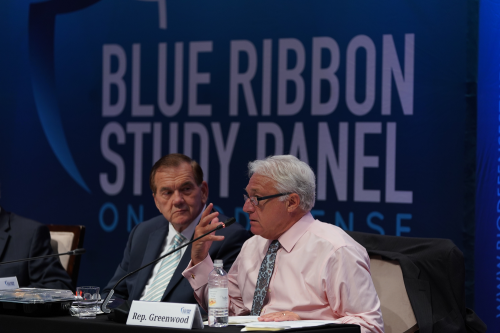
A biological attack could have devastating economic, social, and political consequences. The Blue Ribbon Study Panel on Biodefense held a special focus meeting on The Cost of Resilience: The Impact of Large-Scale Biological Events on Business, Finance, and the Economy.
View Details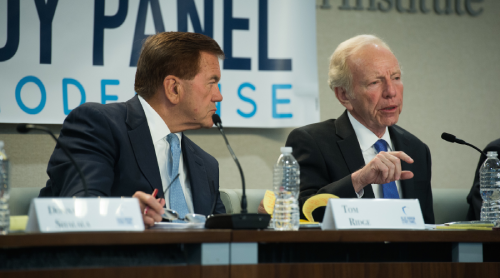
The biological threats to the Nation increase continuously, recognizing no borders. The Blue Ribbon Study Panel on Biodefense held a public meeting to address Transnational Biological Threats and Global Security.
View Details

This meeting provided State, Local, Tribal, and Territorial (SLTT) governments, as well as federal and academic representatives, the opportunity to discuss their perspectives, experiences, challenges, and recommended solutions with regard to SLTT response to large-scale biological events.
View Details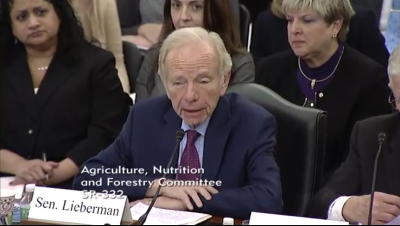
Panel Co-Chair Joe Lieberman testified to the Senate's Agriculture, Nutrition, & Forestry full committee hearing entitled "Safeguarding American Agriculture in a Globalized World".
View Details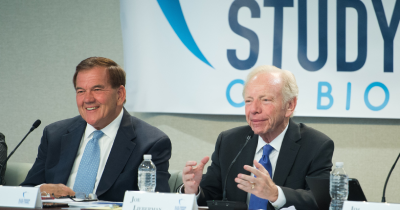
This meeting of the Study Panel addressed the implementation of the National Biodefense Strategy and its implications for the Office of Management and Budget, congressional authorization and appropriation, leadership, coordination, collaboration, and innovation.
View Details
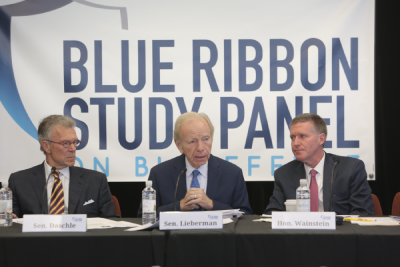
Effective prosecution and decisions regarding U.S. response depend on accurate attribution of biological attacks. Despite ongoing biological crimes and suspected development of biological weapons for the purpose of attacking the Nation, the United States has yet to establish this capability fully. The Study Panel hosted a special focus meeting entitled Attribution of Biological Crime, Terrorism, and Warfare: Challenges and Solutions.
View Details
Dr. Asha M. George presented on Biodetection Strategies within the Context of U.S. Biodefense Efforts. This National Academies of Sciences, Engineering, and Medicine workshop explored alternative effective systems that would meet requirements for BioWatch as a biological detection system for aerosolized agents.
View Details
Dr. Asha M. George was a Plenary speaker, addressing Public Health Leadership, Reform, and Responsibility for Defending the Nation against Biological Threats. This annual, multidisciplinary national conference brings together professionals from public health, health care, emergency management and other disciplines involved in preparing for, responding to, and recovering from public health emergencies. The conference focuses specifically on disasters impacting or within the public health system – rather than only focusing on public health, it includes the other key components of the system including emergency management, emergency medical services, health care, hospitals and the rest of the public health system.
View Details
Robert Bradley, Policy Associate for the Blue Ribbon Study Panel on Biodefense and former staffer for the Senate Homeland Security and Governmental Affairs Committee, talks about various disaster relief programs, what they do, and how they are legislated.
View Details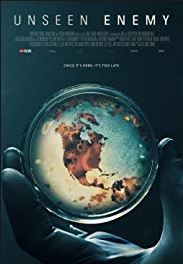
The Blue Ribbon Study Panel on Biodefense joined with the Bipartisan Policy Center and Johnson & Johnson for an evening discussing Unseen Enemy, a documentary about the increased threat of epidemics, and the important policy challenges facing our country and our global allies.
View Details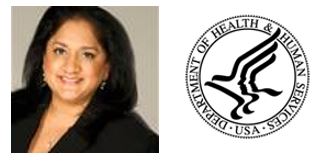
The Diagnostics Integrated Program Team invited Dr. Asha M. George to provide an assessment of preparedness with diagnostics for biological threats from the perspective of the Blue Ribbon Study Panel on Biodefense. This team is part of the Public Health Emergency Medical Countermeasures Enterprise of the Department of Health & Human Service's Assistant Secretary for Preparedness and Response.
View Details
Listen as Dr. Carlin discusses the broad continuum of biodefense and the work of groups like the Blue Ribbon Study Panel on Biodefense and EcoHealth Alliance.
View Details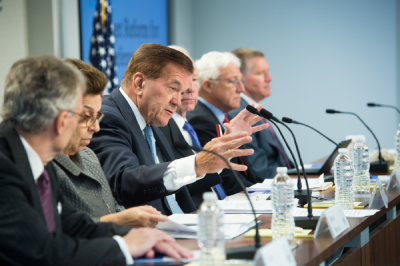
This meeting provided Panel Members with an understanding of and recommendations regarding leadership, interagency coordination, and risk challenges to biodefense budgeting.
View Details
This special public affairs video featuring a discussion with Blue Ribbon Study Panel on Biodefense members on biological threats moderated by Max Brooks (scholar and author of World War Z)
View Details
Dr. Ellen Carlin and Dr. Asha George are Co-Directors for the Blue Ribbon Study Panel on Biodefense, a comprehensive assessment of the state of US biodefense efforts. Dr. Carlin and Dr. George discuss the 33 steps the government can take to mitigate the threats, and improve the nation's biodefense capabilities.
View Details
Fitting for the 2017 Preparedness Summit's theme of looking towards the future, the first plenary session served as an important jumping-off point informing the critical steps we must take to drive national resilience and recovery forward. Co-chairs for the Blue Ribbon Study Panel on Biodefense, former Senator Joseph Lieberman and former Governor and U.S. Homeland Security Secretary Thomas Ridge, were the keynote presenters for this session, discussing strengths, weaknesses, and opportunities related to biological and chemical threat awareness, prevention and protection, surveillance and detection, and response and recovery.
View Details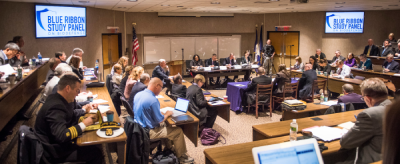
Provide the Blue Ribbon Study Panel on Biodefense with an understanding of agricultural threats, as well as requirements for effective prevention, deterrence, preparedness, detection, response, attribution, recovery, and mitigation of agricultural threats that can inflict catastrophic consequences. Provide non-federal government, industry, and academic representatives with the opportunity to discuss their agrodefense experiences, challenges, and recommended solutions. Address key issues and questions concerning the current state of biodefense and the extent to which it includes agrodefense.
View Details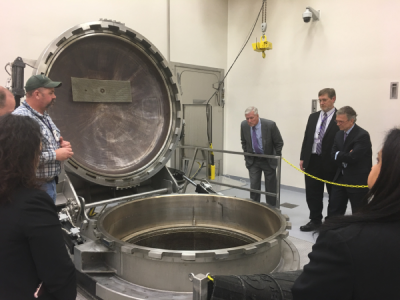
Panel members were offered a behind-the-scenes tour of the Kansas State University's Biosecurity Research Institute. Panel members were also able to see the progress of the biosafety level-4 labortaory under construction. Later that day, KSU President Richard Myers hosted Panel members and guests to dinner overlooking the KSU Bill Synder Family stadium.
View Details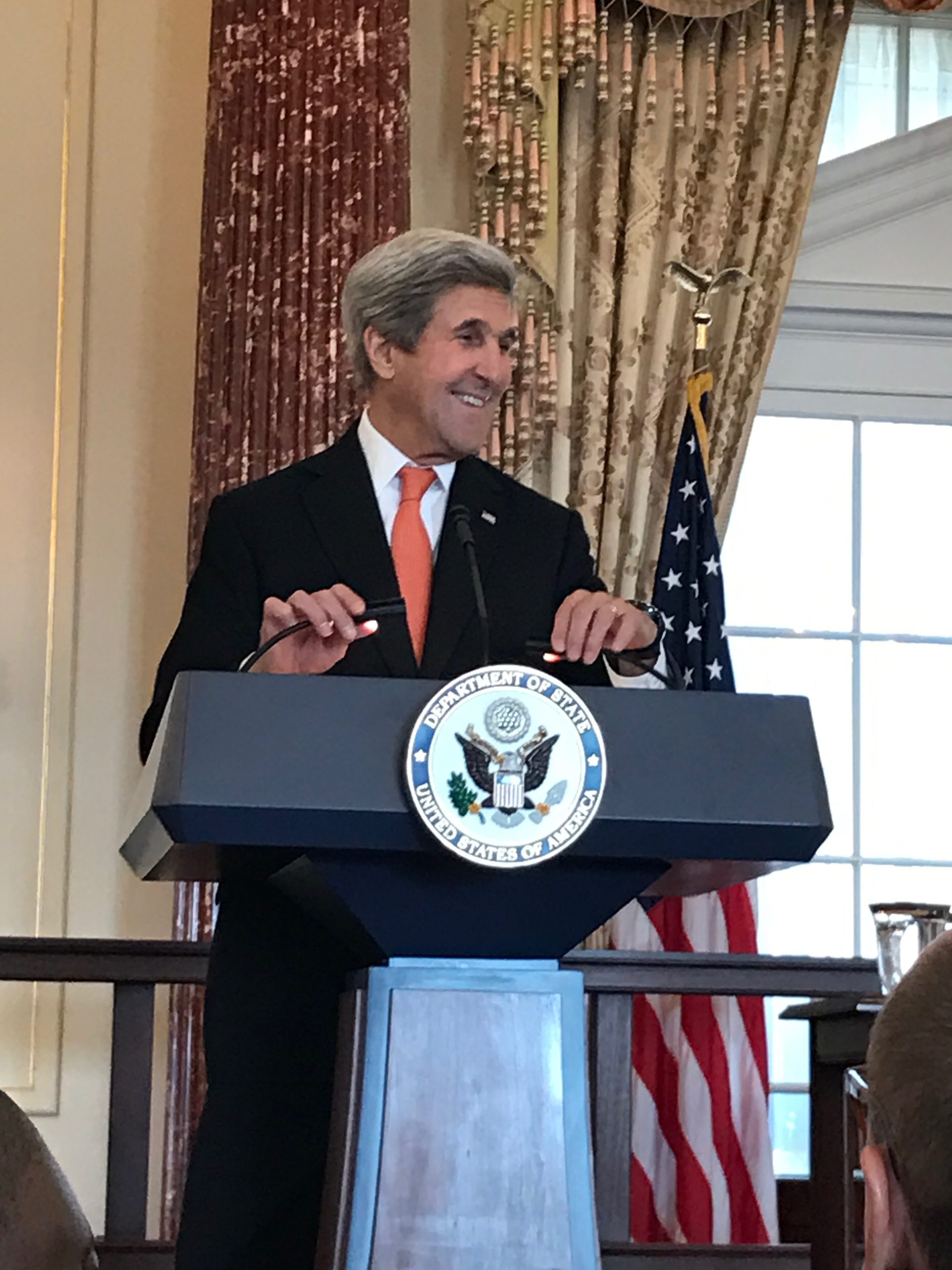
One day after releasing a new report, Biodefense Indicators – One Year Later, Events Outpacing Federal Efforts to Defend the Nation, Senator Joe Lieberman and Governor Tom Ridge, co-chairs of the Blue Ribbon Study Panel on Biodefense, participated in the State Department's event entitled, Advancing the Global Health Security Agenda: Achievements and Next Steps Toward a World Safe and Secure From Infectious Disease Threats."
View Details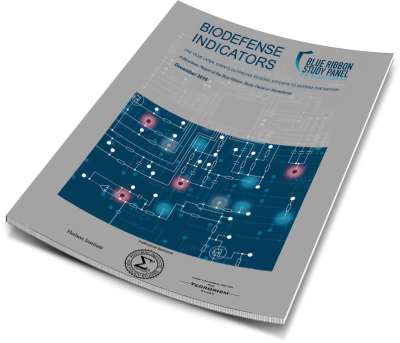
The Study Panel's progress report reviews the status of implementation of each recommendation from the Blueprint for Biodefense as of December 2016.
View Details
Dr. Asha George remarks addressed the current bio/agrodefense landscape.
View Details
Dr. Asha M. George presented an overview of biodefense and the work of the Blue Ribbon Study Panel on Biodefense to the Stakeholders of the Biotechnology Innovation Organization - BIO.
View Details
As part of an expert panel, Dr. Asha M. George, discussed with Members of Congress and congressional staff the current state of biodefense and pandemic preparedness in the U.S. and explained why public-private partnerships remain critical strategies for addressing national security threats. Dr, George presented the views of the Blue Ribbon Study Panel on the Roles of the Public, Academia, and Industry.
View Details
Dr. Asha George presented the views of the Blue Ribbon Study Panel on Biodefense on Mass Gatherings and Infectious Diseases.
View Details
Dr. Ellen Carlin, Co-Director of the Blue Ribbon Study Panel on Biodefense, discussed the Panel's recent report which says the US is not prepared to deal with a biological event. How will funding be reinvigorated? How will public-private partnerships transform?
View Details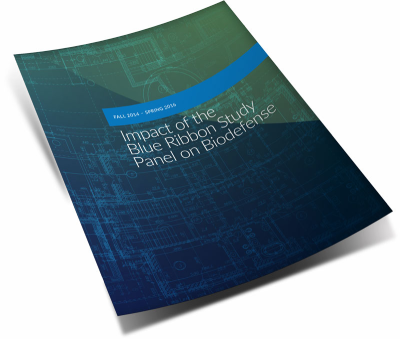
An overview report of the impact of the Study Panel's recommendations on the public, Congress and Administration as of Spring 2016.
View Details
Dr. Asha M. George was invited to present a status report on the Blue Ribbon Study Panel on Biodefense.
View Details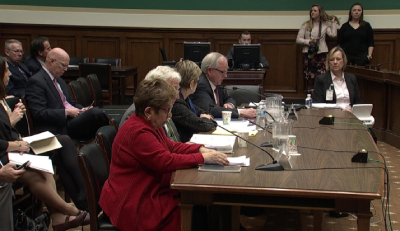
Dr. Donna Shalala and Representative James Greenwood served as witnesses on the Subcommittee on Oversight and Investigations of the House Committee on Energy and Commerce holds hearing, "Outbreaks, Attacks, and Accidents: Combating Biological Threats".
View Details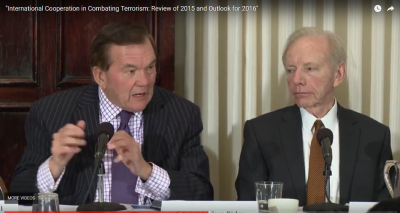
The international community faced two major categories of security challenges in 2015. The first stems from “natural disasters” (e.g. infectious disease epidemics) and the second consists of “man-made threats” (e.g. radicalization and violence). The purpose of ICTS' 18th annual security event was to focus on past lessons of international cooperation in combating human calamities and extremist actors as well as to assess the prospects for regional and global multilateral policies and actions in 2016. Panel Co-Chairs Governor Tom Ridge and Senator Joe Lieberman discussed the Panel's objectives and recommendations.
View Details
Dr. Ellen Carlin, Co-Director of the Blue Ribbon Study Panel on Biodefense, served as a Panelist at The National Academy of Medicine's two-day workshop entitled The Nation's Medical Countermeasure Stockpile: Opportunities to Improve the Sustainability of the CDC Strategic National Stockpile.
View Details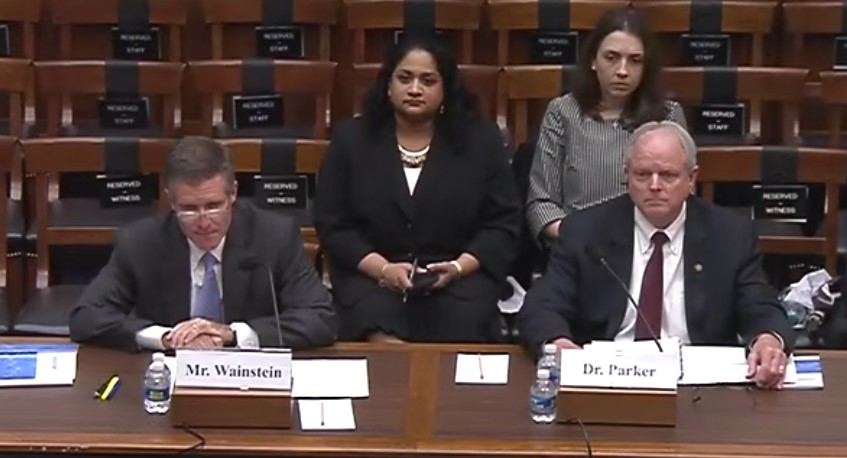
The subcommittee on Emerging Threats and Capabilities of the House Committee on Armed Services held a hearing entitled, "Outside Views on Biodefense for the Department of Defense" and Panel member Honorable Kenneth Wainstein and Panel exofficio member Dr. Gerald Parker served as witnesses.
View Details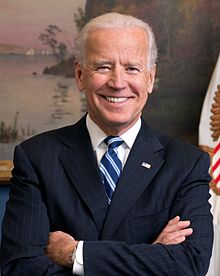
On December 16, 2015, Senator Joe Lieberman and Governor Tom Ridge, Panel Co-Chairs, and Senator Ron Johnson and Senator Tom Carper, then Chairman and Ranking Member of the Senate Committee on Homeland Security and Governmental Affairs, met with then Vice President Joe Biden at the White House. The purpose of the meeting was to discuss the findings and recommendations of the Panel, released previously in October 2015 in its National Blueprint for Biodefense, including the Panel’s first recommendation, for the Vice President to take charge of the nation’s biodefense enterprise. Vice President Biden assured all present that the White House took the biological threat – and the Panel’s report – seriously.
View Details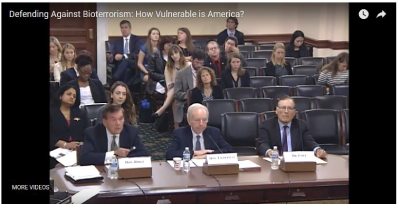
The House Committee on Homeland Security hearing, "Defending Against Terrorism: How Vulnerable is America?," focused on the findings of the Blue Ribbon Study Panel on Biodefense’s recently released Bipartisan Report. Panel’s Co-Chairs Senator Lieberman and Governor Ridge updated Committee Members on the Panel’s work and the state of U.S. biodefense leadership and programs, including recommendations for improving our national defense against biological threats.
View Details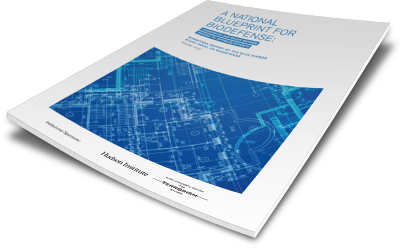
The Panel held a press release to launch its first report, A National Blueprint for Biodefense: Leadership and Major Reform Needed To Optimize Efforts.
View Details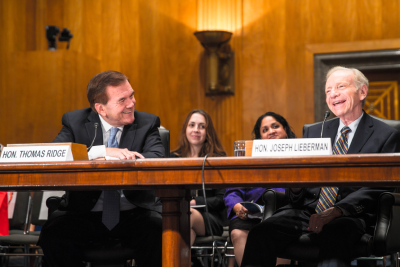
Senator Lieberman and Governor Ridge served as the witnesses for the Senate Committee on Homeland Security and Governmental Affairs' hearing, "Assessing the State of Our Nation's Biodefense".
View Details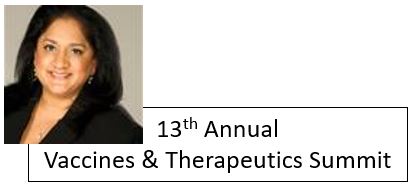
Dr. Asha M. George, Co-Director of the Blue Ribbon Study Panel on Biodefense, was a featured speaker addressing Congressional Perspectives on Biodefense and Emerging Infectious Disease Policy.
View Details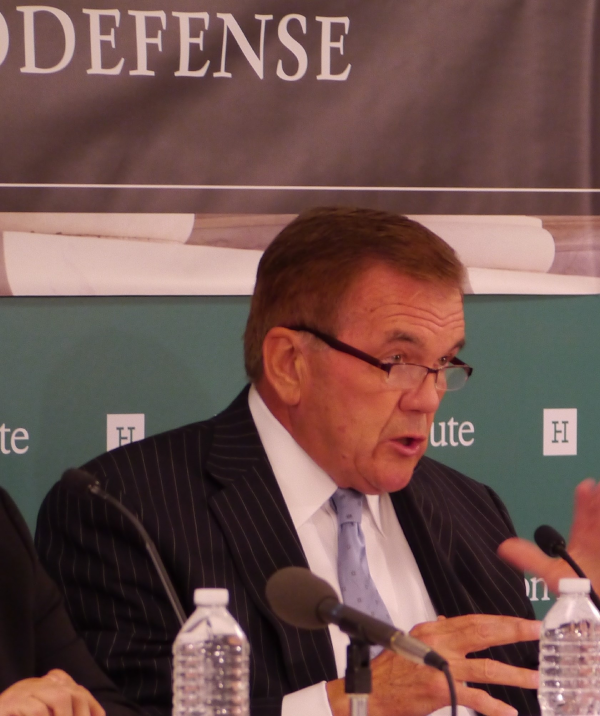
This meeting provided the Panel members with an understanding of the biodefense requirements for effective preparedness, response and recovery from biological threats that can inflict potentially catastrophic consequences.
View Details
In March 2015, the NYC DOHMH remotely convened a meeting of its Directly Funded City partners (Washington DC, Los Angeles, and Chicago) to discuss their unique biopreparedness challenges along with recommended solutions in the areas of preparedness funding, dispensing of medical countermeasures, and planning for a BioWatch Actionable Result.
View Details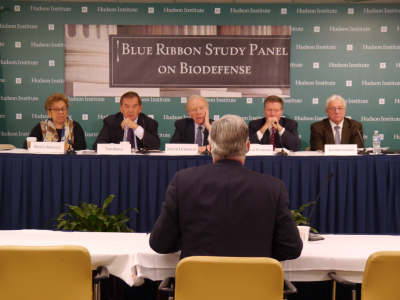
Panel members were provided with an understanding of the biodefense requirements for effective surveillance and detection of biological threats that can inflict potentially catastrophic consequences. Representatives of the surveillance and detection arena were able to discuss their biodefense experience and challenges with the panelists.
View Details
On March 9, 2015, MESH Coalition invited partners from Central Indiana and five states to participate in a roundtable discussion on the state of hospital preparedness. The focus of the discussion was on current funding challenges, reimbursement models and measuring community resilience.
View Details
Dr. Asha M. George was invited to present an overview of the Blue Ribbon Study Panel on Biodefense.
View Details
On February 24, 2015, the Texas A&M Health Science Center, along with partners at the Institute for Infectious Animal Diseases and The Bush School of Government and Public Service, convened a half-day roundtable to address the human-animal interface. Science and policy experts, including state and federal government, former federal government, and academia provided input regarding challenges in zoonotic disease, from surveillance to countermeasures.
View Details
On February 19, 2015, the Alliance for Biosecurity, a DC-based industry coalition, convened both member and non-member companies for a full day to discuss challenges in medical countermeasure development and to provide solutions for improving the public-private partnership in this area.
View Details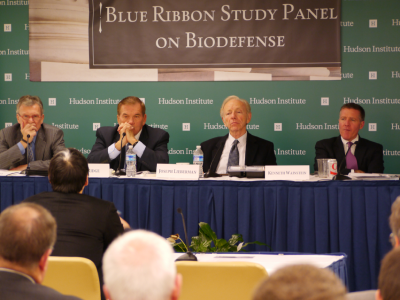
Speakers presented Panel Members with perspectives on the status and effectiveness of biological threat prevention and protection efforts. Topics included biological arms control, cooperative threat reduction, biosecurity, vaccination, and Ebola and pandemic influenza response.
View Details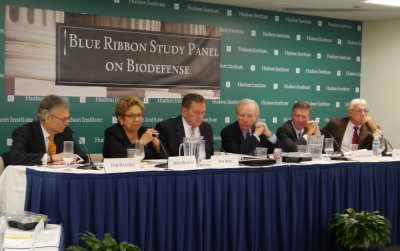
This first meeting of the Blue Ribbon Study Panel on Biodefense served to provide the Panel members with a holistic view of the potential risks and opportunities to address vulnerabilities posed by biological threats that can inflict potentially catastrophic consequences.
View Details
Governor Ridge provided his vision for the Study Panel and how the Panelists and their recommendations could impact policy -making in the 114th Congress and the next Presidential Administration.
View Details